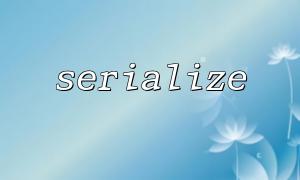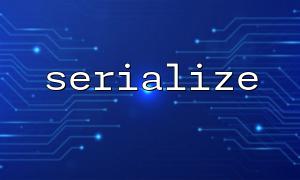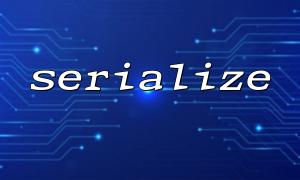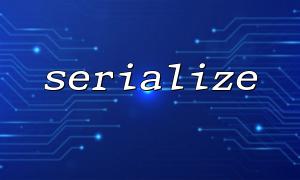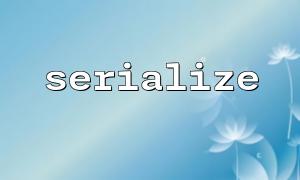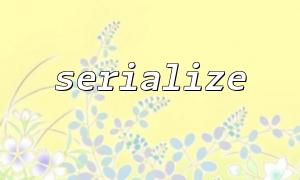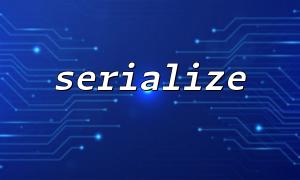In PHP programming, the serialize function is often used to convert data into strings, so that data can be stored or transferred. Despite its powerful capabilities, there are some potential security issues with the use of serialize functions when dealing with sensitive data. This article will explore how to use the serialize function in PHP to prevent sensitive data leakage, analyze its security issues, and provide corresponding solutions.
In PHP, the serialize function converts a PHP data type (such as an array or object) into a string that can be stored or transferred. The function is to convert complex PHP data structures into a simple representation, which facilitates storage, sending and recovery.
$data = array('username' => 'admin', 'password' => 'password123');
$serializedData = serialize($data);
echo $serializedData;
The above code will convert the array $data into a string for easy storage or transmission.
Although the serialize function is very useful when processing data, its improper use can lead to security vulnerabilities. Especially when serialized data contains sensitive information, if exploited by malicious users, it may lead to data breaches or other security issues. Common security issues include:
When you deserialize data from untrusted sources, malicious users may construct serialized strings containing malicious code or objects. If the program does not have appropriate security measures, these malicious data will be executed, resulting in problems such as remote code execution.
For example, suppose you get serialized data from user input and deserialize:
$serializedData = $_GET['data'];
$data = unserialize($serializedData);
If a malicious user passes a well-constructed serialized string, it can cause PHP to execute malicious code, causing serious security risks.
In some cases, the serialized data may contain sensitive information, such as passwords, personal information, or authentication tokens. If serialized data is stored in an unsafe location or transmitted through unsafe channels, sensitive information may be exposed to unauthorized users.
To prevent sensitive data leakage problems caused by using serialize function, we can take the following measures:
Although serialize is a PHP-specific feature, in many cases we can use the JSON format to replace it. JSON does not involve deserialization of objects, and is relatively safer. For example:
$data = array('username' => 'admin', 'password' => 'password123');
$jsonData = json_encode($data);
echo $jsonData;
Unlike serialize , JSON's encoding and decoding process is simpler and safer, and it does not perform unnecessary code or object operations.
If you have to use the serialize or unserialize functions, make sure that you deserialize only data from trusted sources. Unsecure operations can be prevented by limiting the deserialized data types. PHP provides a allowed_classes parameter that allows you to specify classes that can be deserialized when calling unserialize .
$data = unserialize($serializedData, ["allowed_classes" => ["YourClassName"]]);
In this way, you can avoid deserializing maliciously constructed objects, thereby reducing security risks.
If you need to store or transfer sensitive information, you can encrypt the data before serializing it. By using PHP's encryption extensions (such as OpenSSL), you can effectively protect sensitive data from being compromised.
$encryptedData = openssl_encrypt(serialize($data), 'aes-256-cbc', 'encryption-key');
echo $encryptedData;
This method ensures that even if the data is compromised, the attacker cannot read the contents.
Ensure sensitive data is accessible only by authorized users. When storing or transmitting serialized data, always use appropriate access control measures, such as access tokens, IP whitelists, etc., to prevent malicious users from directly accessing the data.
When transferring serialized data on the network, be sure to use a secure transmission channel (such as HTTPS). This prevents man-in-the-middle attacks and data tampering, ensuring the security of the data during transmission.
The serialize function is a powerful tool in PHP, but its security issues cannot be ignored when processing sensitive data. In order to prevent sensitive data leakage, developers should avoid using deserialization operations directly, adopt more secure JSON encoding methods, or encrypt data before serialization. In addition, data leakage and abuse can be effectively prevented through appropriate access control and transmission encryption. Always be alert and take appropriate security measures to protect user data.
